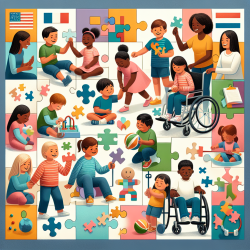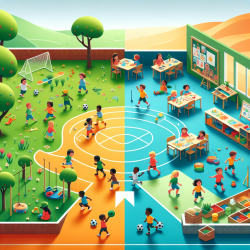Introduction
In the realm of special education, the provision of play and learning materials is not merely an accessory but a necessity, especially for children with physical disabilities. The research article, "The Importance of Providing Play and Learning Materials for Children with Physical Disabilities in Saudi Arabia: The Perceptions of Parents," offers profound insights into the critical role these materials play in the holistic development of children with physical disabilities.
The Role of Parents
Parents are pivotal in ensuring their children with physical disabilities have access to appropriate play and learning materials. The study highlights that parents not only recognize the importance of these materials but also actively seek to provide them, despite facing numerous challenges. Parents are encouraged to engage with teachers and schools to advocate for the necessary resources and modifications that facilitate their children's participation in various activities.
Challenges in Provision
Despite the recognized importance, several barriers hinder the provision of these materials. Economic constraints, lack of awareness, and social stigmas are significant hurdles. The study reveals that many parents face difficulties due to the high costs of specialized equipment and a lack of suitable facilities. Moreover, societal attitudes often lead to a sense of isolation and inadequacy among parents and their children.
Recommendations for Practitioners
- Advocacy and Collaboration: Practitioners should work closely with parents to advocate for better resources and facilities. This includes engaging with local authorities and educational institutions to ensure compliance with disability rights and standards.
- Community Engagement: Building a supportive community network can help reduce the stigma associated with physical disabilities. Encouraging interactions between children with and without disabilities fosters inclusivity and understanding.
- Resource Development: Practitioners can assist in the development of cost-effective and accessible play and learning materials tailored to the needs of children with physical disabilities.
Encouraging Further Research
The study underscores the need for ongoing research to explore innovative solutions and strategies that enhance the accessibility and effectiveness of play and learning materials. Practitioners are encouraged to contribute to this body of research, sharing insights and experiences that can inform policy and practice improvements.
Conclusion
The transformative power of play and learning materials cannot be overstated. They are essential tools that empower children with physical disabilities, fostering their development and integration into society. By addressing the challenges and implementing the recommendations from this research, practitioners can play a crucial role in shaping a more inclusive and supportive educational environment.
To read the original research paper, please follow this link: The Importance of Providing Play and Learning Materials for Children with Physical Disabilities in Saudi Arabia: The Perceptions of Parents.










